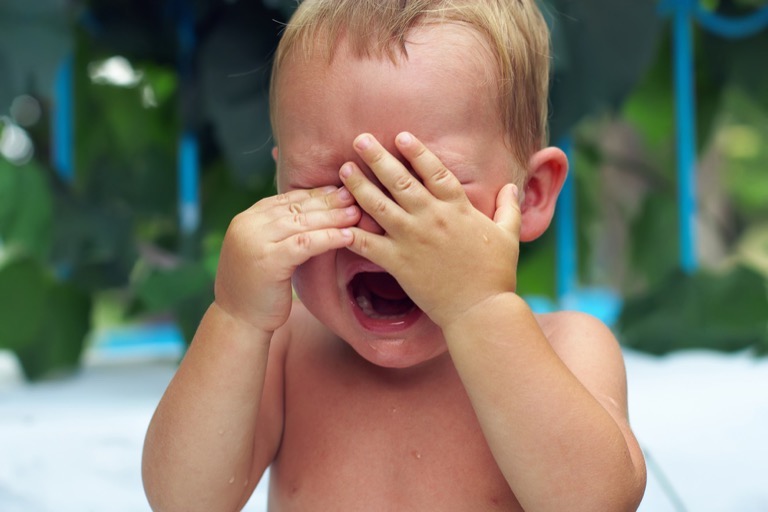Your baby has a lot of things going on in her little life. New stimulation is continually stretching her brain and strengthening her tiny body. Can you imagine living in a world where everything was utterly novel all the time? It must be exhausting (and thrilling)!
Your baby’s brain and body need to rest from all of the excitement in order to keep learning and growing. The amount of rest she needs changes as she gets older, but it’s no less important. Here is a breakdown of how much sleep your baby needs based on her age:
| Age | Total Sleep | Naps per Day |
|---|---|---|
| 0-12 weeks | 16-18 hours | 4-6 |
| 4-5 months | 12-16 hours | 3-4 |
| 6-12 months | 12-16 hours | 2-3 |
| 1-2 years | 11-14 hours | 1 |
| 3-5 years | 10-13 hours | 0-1 |
Unfortunately, the biggest hindrance to your baby getting restful sleep is being overtired. If you miss the “good tired” window, your baby’s body will flood with hormones that will help her stay awake. These hormones, cortisol and adrenaline, are coping mechanisms that help her body stay alert even when tired. Unfortunately, when your baby gets this “second wind,” it will make naptimes and bedtimes even more challenging and less fruitful. Thus a vicious cycle of tired and overtired begins.
To combat this common pitfall, you need to keep close tabs on your child’s behaviors to ensure that she’s getting rest when she’s tired. Each baby is different, but some common “tells” can give you clues about your baby’s fatigue. When you see her exhibiting these signs, it’s time to dim the lights and wind things down.
1. Sucking on Fingers: This is more common with very young babies, but it is a sign of tiredness that can transfer into older children, also. Sucking helps comfort your baby and make her get ready to relax.
2. Hyperactivity: This one is a little abstract because babies and toddlers often go through stages of calm and excitement throughout the day. If you notice that your baby is all of a sudden keyed up and moving everywhere, she might actually be tired. She’s unconsciously trying to stay awake because #FOMO is real, and suddenly you find her dancing on top of the refrigerator! When hyperactivity happens somewhere around naptime or bedtime, that’s a clue that she’s ready for a break, and you’d better wrap it up soon.
3. Clinginess: If your normally independent baby or toddler is stuck to you like, well, whatever that sticky mess is on your kitchen table right now, she’s probably getting tired.
4. Clumsiness: Scientists have said that being tired causes a lot of the same physical, mental, and emotional responses as being intoxicated. Basically, the brain slows down, and that can cause an increase in clumsiness or incoherency (which can be difficult to spot because, you know, toddlers…). If your toddler is clumsier than usual, she may be ready for a nap.
5. Tantrums: Toddlers are prone to tantrums regardless of tiredness because they have a lot of Big Feelings crammed into their tiny bodies. Sleepiness tends to amplify those Big Feelings until you suddenly find yourself with a snot-nosed, tear-stained toddler that has thrown herself onto the floor and is shrieking like a banshee because you gave her the cup of Cheerios that she asked for. (deep breath in…. deep breath out…) Full-blown tantrums are definitely a sign that your tot is tired.
6. Randomly Falling Asleep: This one is a pretty obvious sign that your baby or toddler is tired because, well, she fell asleep in the middle of your backyard (or the stroller or the highchair or the car seat or your arms as you walk through the grocery store). Even though sometimes your baby needs to get sleep however she can get it, you need to try your best to have her sleep in a bed. She’ll sleep better and longer, and you’ll avoid the crab monster that emerges a few hours later.
7. Boredom: Boredom is yet another sign that your baby is getting tired. Babies are naturally curious little people, so when she’s zoning out or disinterested in the toys or food she normally loves, she’s ready for a nap or bedtime.
8. Classic Signs: Yawning, rubbing eyes, getting snuggly, laying head down – you know these signs because you probably do them yourself.
9. Tugging on Ears: This tell is a little more common with young babies, and it’s easy to misread since it resembles ear infection symptoms. If you notice your baby rubbing her ears consistently around naptime or bedtime, it could be her way of telling you she’s tired.
Baby and toddler sleep probably feels like an enigma at times, and it is, to a small degree. Your child’s tells will likely shift over time, but by staying alert to her tiredness signals, you can adjust her schedule to meet her needs and keep everyone happy.
Need help getting your baby to sleep? Perhaps they’ve always struggled? Or maybe they’re dealing with sleep regression? Regardless of your needs, contact our certified sleep consultants, and we’ll help you get the guidance and resources you need.


